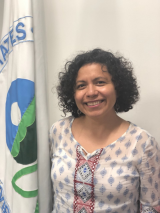Profiles of Hispanics at EPA: Fabiola Estrada
Fabiola Estrada, Life Scientist,
Project Officer
Regional School IPM Coordinator
Region 9
Pesticides Office
Southern California Field Office
Office of Pesticide Programs
Question: Where were you born?
Fabiola Estrada: I was born in a small agricultural town (less than 500 people) in the state of Puebla, Mexico.
Question: What is your highest level of education? What was your major?
Fabiola Estrada: I received a master of science in industrial hygiene from the University of Washington in Seattle. I went to the University of California – Berkeley for my undergrad. My bachelor’s degree is in molecular environmental biology with a minor in education. I have a second minor in Spanish. Furthermore, I was the first one in my family to obtain a college education.
Question: What brought you to EPA?
Fabiola Estrada: My desire to work for the agency with the authority to regulate pesticide use in agriculture. My interest stemmed from witnessing the effects of pesticide exposure on one of my uncles. He was a teenager in Mexico at that time. That incident inspired me to work in a field that promotes the health and safety of agricultural workers.
While in college, I envisioned myself working in a laboratory doing research. But as a result of several summer internships/research programs, I “discovered” EPA. Besides, who wouldn’t want to work for an agency with the mission to protect human health and the environment? I first joined EPA in the Philadelphia regional office as the worker safety coordinator in the Pesticides Office. Two years later, I moved back to California to join the Pesticides Office in our San Francisco regional office as a project officer managing pesticide cooperative agreements with state agencies.
Question: What kind of work do you do at EPA?
Fabiola Estrada: Currently, I am a Life Scientist in the Region 9 Pesticides Office. Part of my work entails breaking communication barriers for Spanish-speaking farmworkers so they know their protections under EPA’s Agricultural Worker Protection Standard (WPS) and how to report a pesticide incident to their local regulatory agency. The WPS is aimed at reducing the risk of pesticide poisoning and injury among agricultural workers and pesticide handlers. In addition, I am the Regional School Integrated Pest Management (IPM) Coordinator. School IPM is a national EPA initiative and I’ve worked with various R9 states and tribes on exciting projects to promote its adoption by schools.
One of my projects consists of conducting Train the Trainer workshops for promotores (community health/outreach workers) on how to prevent pesticide exposure at home and in the workplace. We provide the technical information and the promotores deliver the pesticide safety messages directly to farmworkers and their families. I also train pesticide inspectors in the Pacific Southwest on how they can communicate better with Spanish-speaking farmworkers during WPS inspections. The training was originally developed by another regional office and, to date, more than 400 inspectors have been trained by our office in collaboration with the California Department of Pesticide Regulation. Furthermore, I often conduct TV and radio interviews with Spanish-speaking media to educate the community on the importance of reading the pesticide label, implementing IPM practices in the home, and about the WPS.
Lastly, as a Project Officer, I manage federal funds awarded to our States/Tribes/Territories for their continuing pesticide assistance agreements. States/Tribes and Territories implement pesticide laws and regulations at the local level.
I enjoy working with multiple agencies and community organizations to ensure farmworkers are informed about the WPS that was revised in September of 2015, and with industry groups to ensure the regulated community understands their roles and responsibilities under both existing and revised WPS rules.
Question: What message would you like to send young Latinos who are considering going to college?
Fabiola Estrada: If you are interested in a career in an environmental field, I highly encourage you to get involved in various programs at school and in the community. Your first-hand experience will help you identify what you’re truly passionate about. Whether you decide to join a government agency like the EPA, pursue an academic career, or join the private sector, you will contribute the most if you enjoy what you do. Your unique skills will help address the various environmental issues that our community faces. Having an educated and engaged Latino community benefits our society as a whole.

